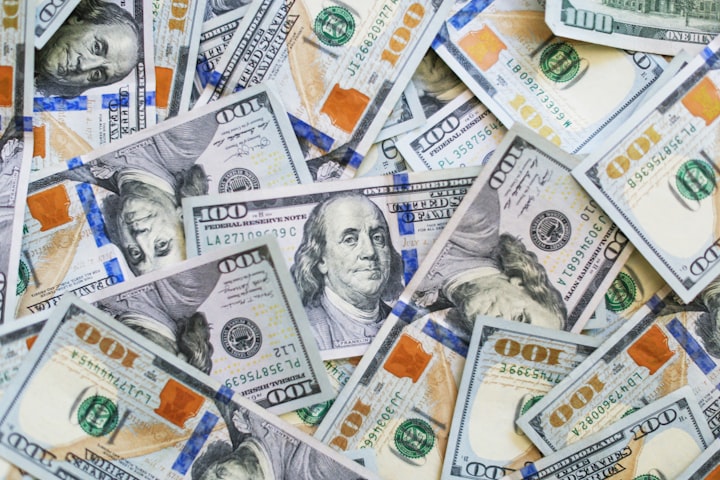What IS "Wealth"?
Change Your mentality - Change Your Reality!

What is wealth? Webster's Dictionary defines "wealth", as
"A large amount of money, or possessions."
"Property that has a money value or an exchangeable value"
"Material objects that have economic utility, especially : the stock of useful goods having economic value in existence at any one time"
For the average person, owning your own home is the pinnacle of financial independence...unless you own your home CASH (NO MORTGAGE), you are MERELY RENTING YOUR HOUSE FROM THE BANK!!! Wealth is not simply "a large amount of money, or possessions", but rather, a large amount of VALUABLE money (last I checked, US dollars are still worth more than Iraqi Dinars!), & VALUABLE possessions. A $1 bill is worth $1...because we all agree it's worth $1. If I, as a landlord tell you that I won't accept US dollars for this month's rent, then what is that $1 bill worth? If enough businesses do that...well...look at Zimbabwe! America has collectively agreed on the "value" of that $1 bill for over 100 years...but we have simultaneously disagreed on the "value", of that dollar: to quote Richard Bissell's 1954 character, Babe Williams :
"It's got so a buck ain't worth a damn now"
And that was 1954! Wealth isn't just how much you make, it's also how much you KEEP. But what do you really keep? Do you account for taxes? Health Insurance? Usable Savings? Retirement Savings? Do you have your budget made? Before you can invest, you have to determine what amount of money you can afford to invest. And prior to investing in ANYTHING, you need to do your research!
Let's assume you've budgeted your income. You know how much it costs you to live; you know how much is left over, therefore, you know how much you can affordably invest. If you have nothing, or not much in that "left over" box...we need to fix your income and budget before we can go any further - more on that a different day. For those of you still around, CONGRATULATIONS! You have been financially responsible enough, for long enough, that you can invest in something.
What do you want to invest in? The most common investment classes are:
- CASH
- Vehicles
- Real Estate
- Publicly Traded Companies
Let's touch on Number One: Irrespective of what country you live in, irrespective of your income; if you receive "money", you'll be receiving that "money" in currency. It might be a check you need to cash, direct deposited into the bank account of your choosing by your employer, or cash from a yard sale...but it will be CASH. Based on your budget, currency is moved around to pay your bills, and realize your "dreams". Some people dream of buying a pizza, other people dream about their next gaming system, cell phone upgrade, vehicle purchase, bigger house etc. Regardless of what your "dream" is, you are limited by what you have to spend. That finite amount of purchasing power, your "spend", is your share in the value of that currency. You make the choice every time you get your paycheck, to keep that amount in "X"...whether that's US, Australian, or Canadian dollars, Euros, British Pounds, etc.; BECAUSE you believe that every 1 "X" you currently have, will continue to be worth 1 "X" until you spend it. Further, you expect that wherever you choose to spend that "X", the person you're buying from will accept "X" for that purchase. You "invest" in your local economy every day simply by keeping currency in your wallet, safe, or bank account.
Number Two: What kind of car is in your driveway? Is it a status symbol? Did you buy it as a utilitarian machine to get yourself around, or were you worried about how people would see you while you were out? Whether your car has a three pointed star or quadruple rings, or a bowtie or blue oval; as long as the vehicle is mechanically sound, it will get you from "point A", to "point B". I've seen plenty of people in BMWs that couldn't afford to put gas in their tank...but the person in front of you at Walmart driving the rusty Grand Caravan owns 50 houses and pays cash for everything! Don't put your money into a depreciating asset, rather, invest your money into appreciating assets...and buy the car you want, CASH, when you can afford it!
Number Three: Real Estate. How do you pay for where you live? Are you renting, or do you own your home? Let's start with the renters - can you afford the home you currently live in? Are you saving money every month? When your lease is up, can you afford to move if your landlord doesn't renew your lease? If the answer is "no", you need to re-evaluate your monthly budget. For the homeowners - do you own your house, or does your house own you? Do you pay your mortgage on time, every time? Do you have savings set aside for when your roof starts to fail, plumbing goes, electrical shorts, windows leak, or...? Are you saving money ASIDE from your home's reserves? If you've properly budgeted for your home, it's an asset...if you're unprepared for a "surprise" bill...your house just became a liability. If you're not saving...you need to re-evaluate your monthly budget! Real Estate is a business just like any other. Someone bought land, legally divided it up, and put a house on it, because they knew the old saying is true: "If you build it, they will come." So long as everything is priced right, real estate is an investment...when individuals begin speculating (buying for price, not value), prices skyrocket - suddenly that "investment" isn't investment worthy...unless you're selling! Unless you can afford to speculate, your housing needs to be acquired due to price, location, & usability...not profit!
Number Four: The easiest for last - Publicly Traded Companies. The ability to trade companies is accessed through your stock brokerage of choice (I use Ally, TD Ameritrade, & Fidelity). You give them your currency, then direct them to exchange currency for shares in a company. You are making a bet that the company you picked will make more currency than it spends, thus increasing the value of your share(s). If you do your research, you can find companies that offer not only equity (shares), but also profit sharing (dividends) based off of your ownership (shares). If you buy enough dividend producing shares, you can replace your income...but most people don't have that kind of time...nor do they want to sit there endlessly researching stocks. SO! An entire industry has sprung up around picking profitable companies, then offering shares in their shares! THAT'S ALL ETFs ARE!!! If you choose to purchase shares of an ETF, versus holding shares directly, DO YOUR RESEARCH!! Is the fund you're buying into well monetized? What are the chances of them losing money/going out of business while you plan to hold those shares? What are the chances of them turning a profit?
In your lifetime, you will have a limited number of investment opportunities...maximize every opportunity, and choose them wisely. To your wealth!!






Comments
There are no comments for this story
Be the first to respond and start the conversation.